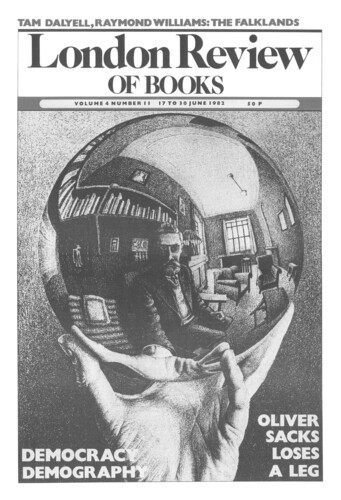Terry Eagleton
Terry Eagleton has written around fifty books, including, most famously, Literary Theory: An Introduction (1983), and around eighty LRB pieces. His subjects have included critics (Erich Auerbach, Mikhail Bakhtin, Georg Lukacs, I.A. Richards, Stanley Fish, Gayatri Chakravorty Spivak), Richard Dawkins’s The God Delusion and many novels. He taught for many years at Oxford, becoming the Warton Professor of English Literature in 1992, and then at Manchester and Lancaster.
Podcasts & Videos
Terry Eagleton: On Humour
Terry Eagleton
Terry Eagleton presents his ideas on what makes funny things funny.
Pieces about Terry Eagleton in the LRB
Is it really so wrong? Evil
Glen Newey, 23 September 2010
English has a problem with the morally bad. Terry Eagleton reports his son’s approving reaction when told that his father was writing a book on evil: ‘Wicked!’ Words like...
It’s not about cheering us up: Terry Eagleton
David Simpson, 3 April 2003
In the age of Sophocles or of Shakespeare, tragic drama concerned the deaths of nobles and notables, individuals whose lives were closely entwined with the health of the state. In the 19th...
Putting on Some English: Eagleton’s Rise
Terence Hawkes, 7 February 2002
In the United States, ‘English’ can mean ‘spin’: a deliberate turn put on a ball by striking it so that it swerves. It’s a subtle epithet, perhaps recording a canny...
Soft Cop, Hard Cop
Seamus Deane, 19 October 1995
Terry Eagleton’s new book, not merely a series of studies in Irish culture but one of the most noteworthy contributions to it of recent times, realigns Irish writing within contemporary...
Saint Terence
Jonathan Bate, 23 May 1991
In 1978 Terry Eagleton wrote an essay on John Bayley in the New Left Review. It is a ritual excoriation of that most tactful of ‘liberal humanist’ critics, punctuated with predictable...
Who can blame him?
Frank Kermode, 5 April 1990
‘Something is happening to the way we think,’ said Clifford Geertz in 1980, and Stanley Fish is right to add that Geertz was partly responsible for the shift. But Fish, in a bold essay...
Moooovement
R.W. Johnson, 8 February 1990
Raymond Williams’s death in January 1988 has been followed by an avalanche of obituarial tribute. To some extent, the tributes were a matter of the Left giving a last, sad cheer for one of...
Unquiet Deaths
Patrick Parrinder, 3 September 1987
According to John Ruskin, ‘in the work of the great masters death is always either heroic, deserved, or quiet and natural.’ Not so in Marguerite Yourcenar’s world. She is...
Pamphleteer’s Progress
Patrick Parrinder, 7 February 1985
Terry Eagleton’s books have been getting shorter recently. It is eight years since he offered to re-situate literary criticism on the ‘alternative terrain of scientific...
From Plato to Nato
Christopher Norris, 7 July 1983
Eagleton’s book is both a primer and a postmortem. It surveys the varieties of recent and present-day literary theory, only to suggest – in its closing chapter – that they had...
Dishonoured
Michael Wood, 5 May 1983
‘All the unhurried day,’ Philip Larkin wrote, addressing a long-dead girl who had been drugged and raped in London, ‘Your mind lay open like a drawer of knives.’ All that...
Read anywhere with the London Review of Books app, available now from the App Store for Apple devices, Google Play for Android devices and Amazon for your Kindle Fire.
Sign up to our newsletter
For highlights from the latest issue, our archive and the blog, as well as news, events and exclusive promotions.

